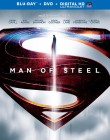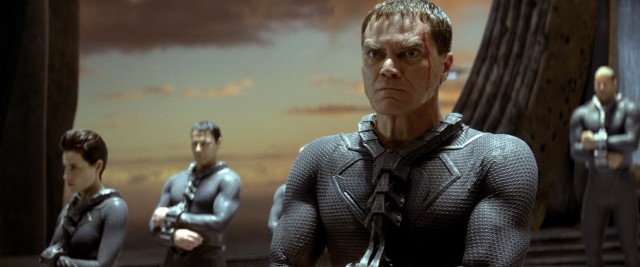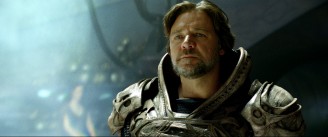Man of Steel Movie Review

Man of Steel is now available on home video. Read our review of the Blu-ray + DVD + UltraViolet combo pack.
 |
Man of Steel
Theatrical Release: June 14, 2013 / Running Time: 148 Minutes / Rating: PG-13 Director: Zack Snyder / Writers: David S. Goyer (screenplay & story), Christopher Nolan (story); Jerry Siegel, Joe Shuster (character) Cast: Henry Cavill (Clark Kent/Kal-El), Amy Adams (Lois Lane), Michael Shannon (General Zod), Diane Lane (Martha Kent), Russell Crowe (Jor-El), Antje Traue (Faora-Ul), Harry Lennix (General Swanwick), Richard Schiff (Dr. Emil Hamilton), Christopher Meloni (Colonel Nathan Hardy), Kevin Costner (Jonathan Kent), Ayelet Zurer (Lara Lor-Van), Laurence Fishburne (Perry White), Dylan Sprayberry (Clark Kent - 13 Years), Cooper Timberline (Clark Kent - 9 Years) |
Buy from Amazon.com:
Blu-ray Combo • Blu-ray Combo + Figurines • Blu-ray 3D Combo • Blu-ray 3D Combo + Glass Stand • 2-Disc DVD
In the summer of 2006, Superman Returns did okay but not great business at the box office. Who better to be involved with this than Christopher Nolan, who perfected the reboot with Batman Begins and has done more than enough to become a favorite filmmaker both of Warner Bros. Pictures and DC Comics. Nolan, however, did not write or direct Man of Steel. He merely produces it and shares story credit with his Batman Begins scribe David S. Goyer. The director's chair is filled by Zack Snyder of 300, Watchmen, and Sucker Punch fame; you should adjust your expectations accordingly.
Man of Steel is an origin film, though it tries to fight that classification in some ways. We open, naturally, on the planet Krypton, which finds itself under siege. A faction led by General Zod (Michael Shannon) is ready to overthrow the planet's order. While the revolutionaries are quickly exiled, Krypton itself is destroyed, but not before Jor-El (Russell Crowe) and Lara Lor-Van (Ayelet Zurer) produce the first natural childbirth the planet has seen in centuries. The newborn Kal-El is sent away to safety.
As you know, he winds up in the aptly named Smallville, Kansas, where he is raised by the most nurturing and loving adoptive parents (Diane Lane and Kevin Costner) he could hope to find. Here, the film opts for nonlinearity, jumping around to different parts in the upbringing of the absolutely anthropomorphic alien who is named Clark Kent. In the present day, Clark is grown up (Henry Cavill) and using his superior strength for stealthy, anonymous acts of good.
One such life-saving act alerts Pulitzer Prize-winning Metropolis journalist Lois Lane (Amy Adams) to Clark's unworldly origin. Lois' editor (Laurence Fishburne) won't publish her incredible claims, so she leaks the story to a blogger. It isn't the power of the press, though, but a distress signal inadvertently sent by Clark that reveals to a still extremely vengeful Zod the planet that the youngest Kryptonian survivor has made his home. Zod's small but mighty army makes contact with Clark Kent, reawakening a 30-year-old feud, with the U.S. military caught in the middle.
Superman's extraterrestrial origins have been well-documented in seventy-five years of comic books and also feature in the quartet of 1970s and '80s Christopher Reeve films that gave birth to the modern superhero movie. The interplanetary nature of this reboot recalls Thor and, to a smaller degree, The Avengers. But Man of Steel clearly aspires not to Marvel Studios-type entertainment, instead using Batman Begins as the blueprint. The weakest link in Nolan's trilogy, that film requires multiple viewings and outstanding sequels to earn appreciation; without the former, the latter never would have come.
Though he has Nolan in his corner as well as a prime release date and a steep budget comparable to those Batman films, Snyder is not Nolan and that fact is evident throughout this serviceable yet unspectacular effort intended to launch a new tentpole franchise. The director enjoyed box office success at the start of feature filmmaking career with his 2004 Dawn of the Dead remake qualifying as a mid-range sleeper and his 2007 follow-up 300 catapulting him to blockbuster heights. Since then, Snyder has struggled commercially and critically, with Watchmen fizzling after a potent opening weekend, his computer-animated departure Legend of the Guardians: The Owls of Ga'Hoole interesting nobody, and Sucker Punch flat out bombing. He doesn't seem like the safest or savviest filmmaker to entrust with a film that anything less than a billion dollar worldwide gross will label a disappointment. Then again, it's only hindsight that makes Sam Raimi, Jon Favreau, and even Nolan viable choices to steer comic book behemoths.
Snyder is an action director and that is what he brings to Man of Steel: lots and lots of action. It's in 3D, though as an obligatory afterthought conversion, darkened colors are the format's most noticeable feature. Even if overly shaky camerawork challenges your appreciation of them, the visual effects and production design are terrific, as they should be for a film that cost $225 million to make. Beyond those, things are less admirable.
Outside of Nolan's Batman movies and (Burton's before them), filmings of DC Comics have struggled to resonate with the public, with Marvel Studios handily outpacing them in volume and median popularity. While Nolan's Batman outings do offer state-of-the-art action, they have much more than that: multi-faceted characters, complicated relationships, real-world relevance, rich atmosphere, bold villains, and compelling scenarios. Man of Steel seems to want to give us all of that too, but it only succeeds enough in each category to add up to relatively diverting summer popcorn fare.
The cast assembled here is quite full of talent. Adams instantly classes up the proceedings even if the film's crudest line is one of the first out of her mouth. Shannon, who has relished playing leading man in indies with double-digit theater counts, effortlessly acclimates to his biggest movie to date, chewing scenery with vein-popping outbursts while looking even odder than usual in the substantial villain role. Large stretches pass with minimal dialogue, as Snyder repeatedly treats us to old-fashioned fistfights and the steroidal equivalent of them (hurling armored large, virtually invincible masses at one another). The thin plot is advanced by "command keys" resembling flash drives. The film does not have much in the way of humor; the trailer's big joke, derailing what would be the first utterance of "Superman", and a workplace accident sign gag are about the height of the comedy. (At my screening, a young viewer's audible "Uh-oh" during a tense, quiet moment drew a bigger response than either of those.) While there is no rule that superhero movies should make you laugh, the best ones often do; even Nolan's dark, moody epics seized some opportunities for levity. Man of Steel need not be funny, but it should be fun more often than it is. When a superhero movie -- and a decently-made, lavishly-produced one about Superman at that -- doesn't qualify as wall-to-wall entertainment, it's tough to be completely satisfied.
Support this site when you preorder Man of Steel now from Amazon.com:
|
Related Reviews:
DVDizzy.com | DVD and Blu-ray Reviews | New and Upcoming DVD & Blu-ray Schedule | Upcoming Cover Art | Search This Site
Now in Theaters: Iron Man 3 • The Great Gatsby • The Hangover Part III • The Internship
The Dark Knight Rises • Thor • Captain America: The First Avenger • The Amazing Spider-Man • Spider-Man • Fantastic Four • Iron Man
Henry Cavill: Stardust • The Tudors: The Complete First Season • Whatever Works
Amy Adams: The Muppets • The Fighter • Trouble with the Curve • The Master • Enchanted • Doubt
Michael Shannon: Premium Rush • Take Shelter • The Runaways • Revolutionary Road
Russell Crowe: The Insider | Kevin Costner: The Company Men • The Guardian | Diane Lane: Secretariat
Written by David S. Goyer: FlashForward: The Complete Series




